While road-tripping down to CarolinaCon, a few of us in the car were seeing the “hugs at hackercons” thread on Twitter. It generated a bit of good discussion among us, but for the most part we were focused on getting to Raleigh and presenting and socializing and generally having a good time. Of course, the hacker community’s chatter is fast-moving and mere days later, we seem to have moved on to RSA dress codes and the awful antics of BlueCoat. So, while this blog post is hopelessly outdated now, I’m still offering my thoughts. 😉
Much of the HugGate matter seemed to come down to the following arguments (often badly-expressed and hopelessly truncated by Twitter’s 140-character limit)…
“I don’t want to be hugged at conferences”
“So then tell people to not hug you”
“I shouldn’t have to tell others, they should just not hug people”
“Hugs are awesome, you’re just silly if you don’t like them”
“Hugs vs Handshakes is a clear-cut case in most of the world (link to this article)”
“The hacker world isn’t the business world, we’re a family”
“But some people are aspy and don’t like to be touched”
“No one should ever be touched if they don’t want it”
“So no one should hug anyone?”
“That’s not what I said!”
“I’m going to hug you!!”
“I like hugs, that’s fine!”
“Fine!”
“So, are we still arguing?”
… and so on and so on. The crux of these issues was distilled down by many into to two camps — pro-hug and anti-hug — but that’s an over-simplification. A fairer pair of titles would be pro-hug-environment and anti-unwanted-contact and their positions could possibly be summarized thusly…
Pro-Hug-Environment: “We like to surround ourselves with friends and family in the hacker world and we value situations when the context allows for many hugs and close contact. With much time spent in the cold and impersonal business world, it’s nice for us to create a space where people are much closer.”
Anti-Unwanted-Contact: “That’s great that you love being all friendly, but some folk take it too far… and when I’m at hacker events, I have to fend off unwanted hugs or other contact because of the environment that’s been cultivated. The onus shouldn’t be on me to prevent what I see as harassment.”
.
Here’s the thing… both of those camps have elements to their arguments that are quite valid. No one should ever be subject to touching or direct contact that they find unwelcome. (Unlike speech, which I feel anyone should be able to express at just about any time, actions — such as direct contact — should never be forced on to another party.) Alternately, if a group of people seeks to create an environment where they feel more at liberty to bond and be more casually intimate with liberal hugs, etc… that’s their right, too. Let’s not forget that hacker cons are, by and large, private events and it’s fine for them to reflect the views and values of their creators and participants.
Sometimes, we forget that all situations are different and every “event” or “gathering” or “space” has its own unique values and atmosphere. Trying to map the values and behaviors associated with a workplace on to a hacker con or those of a music festival on to a public park is about as logical as trying to map the norms of one country’s citizenry on to those in a foreign land.
It’s important to consider the base-rate of behavior and the commonly-accepted norms in any circumstance and allow that to dictate our mores, norms, and rules of proper conduct.
.
I propose the following when it comes to hugs… think about the situations around you on a hug spectrum …
… for those who can’t read this easily (you can click any of these images for larger versions) it’s essentially a scale of how intimate the greetings tend to be between both (a) people known to one another and (b) people meeting when the don’t know each other very well. Here’s a written breakdown of the various points on the axis…
+4 Big kisses for basically anyone who comes along
+3 Hugs liberally shared all the time. Small kisses common, too, even upon introduction
+2 Hugs typical as an introduction, little reservation shown among known folk
+1 Hugs common between all friends and acquaintances, sometimes hugs even during an introduction
+0 Hugs for family and very close friends only, handshakes upon introduction to new people
-1 Folk pretty reserved, usually shake hands even if known already. Handshake almost always as introduction to new folk
-2 Hugs are outright considered odd in public, even if known. During introduction, only handshakes are used
-3 People prefer to not have any physical contact with unknown folk
-4 No acknowledgment of strangers out in public
… so, I’ve made this pretty wide-ranging. I think that we can safely dismiss or at least not give much consideration to the environments at the +4 and -4 ends of the specturm. You’re unlikely to see the +4 “Kiss basically anyone who comes along” as the norm outside of hippie gatherings, raves, or the declared end of a world war. Likewise, the -4 “No acknowledgement of strangers out in public” standard doesn’t really apply anywhere outside of the most repressed dictatorial or religiously-fundamentalist regimes.
.
But almost all of the other points on this spectrum are fair game in some situations. I think that the zero mark in the middle of the axis could be called “the United States societal standard.” We are a people who hug, but your typical American doesn’t go around embracing just anyone. Our society’s normal method of introduction is the handshake.
.
On the hug spectrum, however, it’s important to consider both the base-rate for a given situation as well as the margins directly on either side of that mark. A society or group can be thought of as supportive and inclusive if they are aware of others whose preferences and standards lay a little bit outside of the mean. See here…
In the USA, it’s not uncommon to encounter +1 people who offer hugs as a form of introduction. Alternately, there are plenty of -1 people here who are reserved and don’t offer hugs often at all, even to people whom they know. Being an accepting person means expecting to meet people like that with some regularity. The red arrow folk should keep themselves open to social cues and indicators so that the yellow arrow folk do not have to offer a lengthy explanation of their slightly different position. This is the kind of environment that we should aspire to have. People on the margins should feel accepted and not like they are troubling others or in need of constantly explaining themselves to others.
.
Let’s apply this hug scale to the business world…
… where the norm is handshakes. Handshakes are always the default when meeting new people, and for the most part they’re what’s shared even between people who know each other. Of course, the rule of the margins applies…
… some people in the business world are comfortable hugging friends, even at the office. Others in the business world consider any kinds of hugging in the office — even if family visits — to be unwarranted. Again, these yellow arrow folk should not have to explain their position explicitly every time when meeting new people. Most folk should just pick up on social cues and be able to tell whether someone’s preferences are slightly different and act accordingly.
.
This “rule of the margins” applies, no matter where the base-rate may be. Consider a society that is very different from the USA, such as Brazil…
While I’m sure there may be some citizens of the world’s fifth largest nation may disagree with the above chart, it’s quite definitive that they are a much more touchy-feely people than Americans are. Embraces and even the customary Latino kiss-on-each-cheek are common for all sorts of greetings. And, as the yellow arrows in the margins indicate: for some people there hugs are only “typical” and not absolute, or on the beaches of Rio during Carnival lots of kissing with strangers is abundant.
.
An inverse of this can be seen in many Muslim nations, where repressive religious values result in societies around -3 on my scale. Instead of touching other people, many citizens opt for the salām… a greeting of peace which is often bestowed not with a hand outstretched, but rather simply held over one’s own chest. Again, in such societies, one does well to be on the lookout for people on the margins… either those who do opt to shake hands or those who are strictly conservative and prefer almost no acknowledgement of strangers (this particularity usually only manifests itself when the interaction is between two people of differing genders.)
.
So where does this leave us with hacker cons? Well, let’s turn again to the base-rate as far as hugs are concerned.
While there are many people who might disagree, I take the position that within the hacker community and at our cons, the norm tends to be the +2 mark on the hug spectrum. While certainly not obligatory, hugs are typical when meeting new people. So, when we apply our rule of the margins, what does that tell us?
Individuals whose preferences lay at the yellow arrows should not be made to feel like outsiders or oddballs at hacker cons. The general attendee base, if they are truly interested in keeping our community a welcoming and accepting place, would interact with each other on the principle that most people are a +2 while at the same time keeping their eyes open to the possibility that a person they encounter could be a +1 or a +3 hugger… social cues and nonverbal communication should hopefully be sufficient most of the time to convey those nuances.
.
What about actual outliers, however? At a hacker con, maybe some attendees are the type to simply only hug family and close friends. Or, on the other end, maybe some folk are the type to be super liberal with passionate kisses for those around him or her.
In each such case, I do not think it’s wrong for these people to be considered statistical outliers. They are far-enough removed from the base-rate of that particular environment that it could surprise most others there. This is not to say that there is anything wrong with someone such as this. Again, I firmly believe that anyone may hold their own opinions and values when it comes to personal contact, and that they should be able to do so without shame or reprimand.
However, when a person is sufficiently removed from the base-rate, obligations under the social contract shift a bit. I feel that no longer should it be considered the burden of the group to be on the lookout for and be able to subtly detect when this very different value is held. If someone is an outlier, then the burden shifts further to them in terms of communicating their values and preferences when encountering other people.
Attire, stance, and demeanor go a long way to helping this communication, of course. Wearing business-casual clothing and maintaining a respectable distance from others during a new introduction at a hacker con can help to signal that you’re more comfortable with the business-world standard of “handshakes are the norm” but I believe that no one should be thought of as a bad person if they fail to pick up on this. A friendly but straightforward “hah, sorry, I’m not much of a hugger” can be communicated if someone leans in for an unexpected embrace. No one should feel bad. The 0 spectrum non-hugger is justified. The +2 hug-desiring hacker shouldn’t feel dismissed or shunned. And the con itself shouldn’t feel bad for cultivating an environment populated by predominantly +1 +2 +3 hug-spectrum folk.
.
Hug if you want to. Shake hands if you prefer. Kiss loads of people or ignore strangers entirely… the choice is 100% yours. But let this hug spectrum be a guide. Familiarize yourself with whatever the base-rate is for any environment into which you proceed (people who know me are aware that I’m a huge supporter of travel and experiencing other cultures, the rule applies there, too) and then do the following…
1. expect that most people whom you encounter will probably have values and actions in accordance with the base-rate
2. be on the lookout for people who are just at the margins of the base-rate and let social cues guide you in those interactions so that these people needn’t explain themselves. it is the responsibility of the group to help them feel included.
3. if you are not just different from the typical base-rate but actually well outside the margins of an environment, be prepared to communicate your feelings and values to others. in those cases, the responsibility falls to you more than to the group.
.
Just because a person who is substantially different from the group around them feels the need to communicate that in order to have healthy interactions, that doesn’t imply that they can’t have a positive experience. I remember reading a very inspiring story which transpired at the 29th Chaos Communication Congress. One participant was reluctant to attend, due to her Asperger syndrome. She knew that hackers are huggers and that the CCC events are often densely-packed with people of every stripe. But instead of letting her fear get the best of her, she chose to attend anyway. With the support of friends, this person wore a shirt announcing prominently that she didn’t care to be touched directly.
Her blog post was one of wondrous joy and happiness. The author explained that by and large, the other attendees which she encountered were supportive and very respectful, making the CCC event accessible to even someone who was well outside the base-rate of the Hug Spectrum for hackers. While the wearing of a prominently-worded shirt might be quite an extreme step to take, it’s just one example of how it is very possible to communicate your differences to those around you and everyone can come out better for it.
.
I’ll let this blog post speak for me.
I’m a hugger, through and through. If you see me, feel free to hug me. If I know you, chances are I’ll approve. Even if I don’t know you, chances are high that I’ll smile and be happy about it all the same.
Just do me (and everyone else around you) a favor: smell nice. A recent shower coupled with clothes that have been laundered goes a lot further in making me comfortable during an embrace than whether or not I know whose arms are around me. 😉
.
.
.

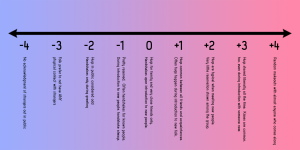

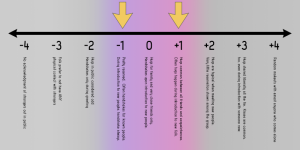
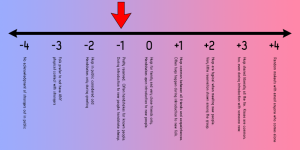
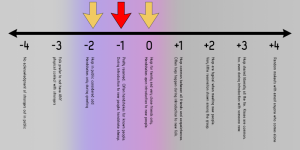
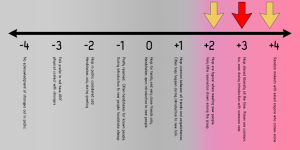
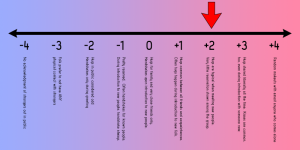
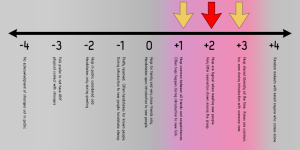
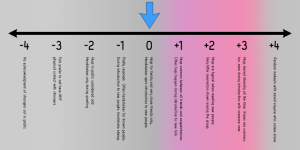
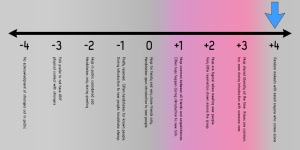
2 Comments
In true hacker fashion, you’ve gone above and beyond, developing a scale to identify levels of hugginess(tm) and then explaining every conceivable aspect of it. And it’s pretty damn impressive.
Derbycon 1.0 was my first ever security conference, and the person I was supposed to meet there, who would handle introductions and whatnot, wasn’t able to attend. To make matters worse, I had another neophyte with me who was looking to me for guidance since I knew a lot of the big names in security. Of course, knowing a name and actually having made the acquaintance of that person are two completely different things. What followed was a lot of wandering around and nervous interaction. In the end, though, we made a lot of friends who we look forward to seeing every year.
What I can say about Derbycon specifically is that while hugging is a thing, it’s certainly not expected of you. Obviously if you present yourself to Dave, you’re in for a big bear hug, but knowing that going in, it was fine. And to be honest, I think if I had balked at a hug, Dave would have respected that.
The biggest issue here is that for folks who are used to being in situations where the HL (hugginess level) is below 0, there’s a lot of consternation about what they perceive to be an expectation of being hugged. Folks with social phobias, spectrum disorders, etc. are especially affected by this. And to those folks, there is a perception that a hug should be requested/announced and they shouldn’t have to look for specific social cues.
You note that those outside of the HL for a specific venue should be prepared to communicate their feelings. And while this seems reasonable, you also need to realize that some of those folks have social fears that may prevent them from being that open. I think we need understanding on both sides, and that may be tough. As long as we’re all open and willing to listen, I think we can make it through all of this. Derbycon, in particular, has an incredible atmosphere of openness and I think anyone who wanted to attend, with or without phobias, would be more than welcomed.
You clearly spent a lot of time thinking about this and I think you’ve pretty much nailed it. Well done.
Deviant,
Once again you have blown my mind with your well thought and off the wall thinking. I am not as fluent with my words as you sir but I agree with what you are bringing out. Being one of the co-organizers and head of security for DerbyCon, I can tell you that I have never been aware of any forced contact even as simple as hugging. There is a ZERO tolerance of that on my watch. Anything in the past that has even started to look like that has been taken care of promptly.
You said it best..”Hug if you want to. Shake hands if you prefer. Kiss loads of people or ignore strangers entirely. the choice is 100% yours.“
And no one is EVER forced to do anything they do not want to do.
I personally fall in the category of hugging those I already have a base friendship with. Especially when it comes to the female gender. Men should be gentlemen. Don’t care if that’s “old school”, it should’t be. It should be old/new/future school. Respect for all.
I can’t express enough how strongly I feel about the matter of anyone, male or female, being touched inappropriately. Our security crew during all DerbyCon parties specifically look for anyone that is vulnerable or needs help back to their room. Till the last person leaves. We’re family and friends. We look out for each other. Is it our job? No, but sometimes you need to go above and beyond. And thats what my crew does. Every year!
Kudos D
nick8ch